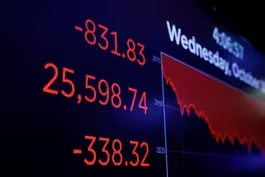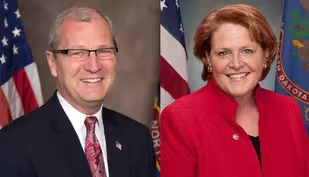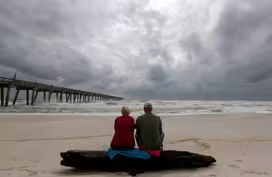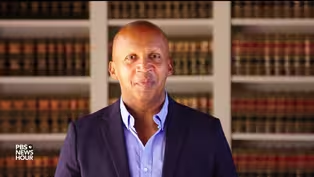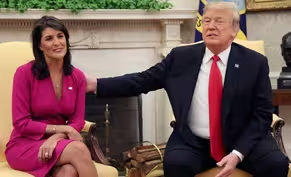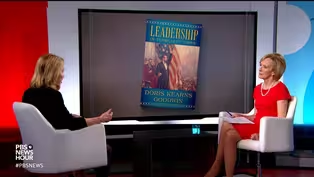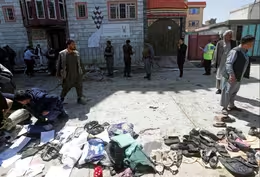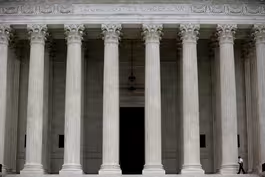
October 9, 2018 - PBS NewsHour full episode
10/9/2018 | 54m 34sVideo has Closed Captions
October 9, 2018 - PBS NewsHour full episode
October 9, 2018 - PBS NewsHour full episode
Problems playing video? | Closed Captioning Feedback
Problems playing video? | Closed Captioning Feedback
Major corporate funding for the PBS News Hour is provided by BDO, BNSF, Consumer Cellular, American Cruise Lines, and Raymond James. Funding for the PBS NewsHour Weekend is provided by...

October 9, 2018 - PBS NewsHour full episode
10/9/2018 | 54m 34sVideo has Closed Captions
October 9, 2018 - PBS NewsHour full episode
Problems playing video? | Closed Captioning Feedback
How to Watch PBS News Hour
PBS News Hour is available to stream on pbs.org and the free PBS App, available on iPhone, Apple TV, Android TV, Android smartphones, Amazon Fire TV, Amazon Fire Tablet, Roku, Samsung Smart TV, and Vizio.
Providing Support for PBS.org
Learn Moreabout PBS online sponsorshipJUDY WOODRUFF: Good evening.
I'm Judy Woodruff.
On the "NewsHour" tonight: stepping down.
Ambassador to the United Nations Nikki Haley announces her resignation, marking the latest high-ranking official to leave the Trump administration.
Then: bracing for Michael.
At least three states declare emergencies as a fast-moving hurricane barrels toward the Gulf Coast.
And as Brett Kavanaugh's tenure on the Supreme Court begins, we take a look at how the confirmation battle is playing on the ground in a key Senate race in North Dakota.
It is this state that is poised to be the biggest determinant this fall in whether Democrats have a chance of retaking control of the U.S. Senate.
All that and more on tonight's "PBS NewsHour."
(BREAK) JUDY WOODRUFF: President Trump is in the market tonight for a new ambassador to the United Nations.
Nikki Haley will formally resign at the end of the year after two years in the post.
Our foreign affairs correspondent, Nick Schifrin, begins our coverage.
NICK SCHIFRIN: In the Oval Office today, President Trump and Ambassador Nikki Haley exchanged mutual praise.
DONALD TRUMP, President of the United States: You've been fantastic.
You're my friend.
And I just -- on behalf of the country, I want to thank you for a great job.
NIKKI HALEY, U.S.
Ambassador to the United Nations: Now the United States is respected.
Countries may not like what we do, but they respect what we do.
They know that if we say we're going to do something, we follow it through.
And the president proved that.
NICK SCHIFRIN: And outside the White House, more thanks from Secretary of State Mike Pompeo.
MIKE POMPEO, U.S. Secretary of State: She's been a great partner of mine for the now five months that she and I had been working together.
And I want to wish her very well.
NICK SCHIFRIN: From the beginning, Haley was well-respected by many U.N. diplomats, well-covered by the media and embraced President Trump's foreign policy and combativeness.
NIKKI HALEY: For those that don't have our back, we're taking names.
NICK SCHIFRIN: She trumpeted the U.S. Embassy move to Jerusalem and the U.S. ending education and humanitarian support for Palestinians.
And when 128 countries voted their disapproval, she once again warned she was taking names.
NIKKI HALEY: The United States will remember this day in which it was singled out for attack in the General Assembly.
NICK SCHIFRIN: On Iran, she reflected Trump policy when she spoke in front of Iranian weapons that she said proved Iran send missiles to regional allies.
NIKKI HALEY: It's hard to find a conflict or a terrorist group in the Middle East that doesn't have Iran's fingerprints all over it.
Foaming at the mouth, suffering convulsions.
NICK SCHIFRIN: And on Russia, she criticized Moscow's support for Syrian President Bashar al-Assad, especially after an April 2017 chemical weapons attack.
NIKKI HALEY: How many more children have to die before Russia cares?
NICK SCHIFRIN: That's where she reflected the foreign policy establishment's antipathy to Russia over President Trump's positive rhetoric.
Allied officials described her as a kind of translator to President Trump's isolationism.
They sought her out and Defense Secretary James Mattis, who today said she did -- quote - - "yeoman's work."
JAMES MATTIS, U.S. Secretary of Defense: We have a very close working relationship.
We saw ourselves in many occasions collaborating together on how we would deal with certain issues.
NICK SCHIFRIN: That collaboration started when former Secretary of State Rex Tillerson's ineffectiveness allowed her to become a high-profile voice of Trump's foreign policy.
But then Tillerson was fired and she didn't get the job.
When Pompeo did, and John Bolton became national security adviser, her wings were cut.
That's when she says she first told the president she wanted to resign, and when she got out over her skis announcing Russian sanctions that never came.
NIKKI HALEY: You will see that Russian sanctions will be coming down.
NICK SCHIFRIN: But that announcement never came.
And top economic adviser Larry Kudlow called Haley confused.
She shot back, she doesn't get confused.
Despite that dust-up, as she had for the last few years, Haley remained in the president's good graces, even though, in 2016, she campaigned for one of his main rivals, Florida Senator Marco Rubio.
NIKKI HALEY: We need to show that South Carolina makes presidents and that our next president will be Marco Rubio!
(CHEERING AND APPLAUSE) NICK SCHIFRIN: Despite that rhetoric, President Trump's criticism of her was always tempered.
DONALD TRUMP: Nikki Haley, a very nice woman.
She said, I'm an angry person.
And they said -- they said you are an angry person.
I thought -- I said, I am.
I'm very angry, because I hate what's happening to our country.
I am angry.
(CHEERING AND APPLAUSE) NICK SCHIFRIN: Haley assumed and conveyed that anger at the U.N. White House officials describe her as overly political.
But, on policy, she reflected the president's style and substance.
For the "PBS NewsHour," I'm Nick Schifrin.
JUDY WOODRUFF: And joining me now is our White House correspondent, Yamiche Alcindor.
So, Yamiche, so many people are asking, why is Nikki Haley doing this now?
She said personal reasons, term limits.
But what else do we know about what's happening here?
YAMICHE ALCINDOR: What we know is that Washington was really, really shocked when Nikki Haley made this announcement.
And it's because our "NewsHour" producers here studied the list of the last 30 years of U.N. ambassadors.
And in almost every single case, when that person resigned in the middle of a president's term, it's because they were taking another job in the administration.
That is not the case with Nikki Haley.
I spoke with someone who's close to Nikki Haley who also helped get elected in South Carolina.
That person says she's very politically ambitious, in a good way, and that she would know when to leave.
And in this case, she's leaving when the administration's having a good couple of weeks.
They had Brett Kavanaugh confirmed.
The trade deal went through.
You also have the economy doing well.
So Nikki Haley is kind of leaving on this high.
There's, of course, this idea that she could run in 2020, but Nikki Haley was very firm today.
She said she's not running in 2020 and she's actually going to help President Trump campaign.
So she's throwing her support behind the president.
But that's pretty much what people are talking about today.
JUDY WOODRUFF: Well, we heard in Nick's report that the president was complimenting her today.
She was complimenting him.
How does her leaving compare to the departure of other high-level Trump administration officials?
There have been a few.
And what do we know about who might take her place?
YAMICHE ALCINDOR: Well, Nikki Haley's announcement is very abnormal because it was so normal.
There's this idea that, in the Trump administration, when people have left, it's usually been because of scandal, and they have been fired via Twitter.
Just a couple lists.
Everyone has been fired on Twitter.
Some of the people are Secretary of State Rex Tillerson.
You have Secretary of Veteran Affairs David Shulkin.
Then you have former FBI Director James Comey, who was fired as he was speaking to FBI agents.
Then there was the whole scene of the motorcade being followed by a news chopper because everyone was so shocked.
Then you have scandals.
The secretary of Health and Human Services, Tom Price, and the EPA administration, Environmental Protection Agency, they were both fired or resigned because of ethical concerns.
All that being said, the president said there are many, many names of people who could be people that would -- that would replace Nikki Haley.
He's floating the idea -- he had floated the idea of Ivanka, even though she tweeted very quickly, I am not going to be the next U.N. ambassador.
There's also Dina Powell.
She's the former White House's deputy of national security.
She's someone who's very well-regarded.
But, really, we're going to have to wait and see, Judy.
JUDY WOODRUFF: Ivanka Trump, his own daughter.
YAMICHE ALCINDOR: Yes.
JUDY WOODRUFF: But he mentioned today there might be a nepotism charge around that.
YAMICHE ALCINDOR: Yes.
JUDY WOODRUFF: All right, fascinating today.
And Nikki Haley leaves at the end of the year.
YAMICHE ALCINDOR: Yes.
JUDY WOODRUFF: Yamiche Alcindor, thank you.
Our other major story tonight is Hurricane Michael.
It is roaring toward the Florida Panhandle and rapidly growing into a major threat.
Landfall is expected tomorrow, possibly near Panama City, and 180,000 people are now under evacuation orders.
So far, Florida, Alabama and Georgia have declared emergencies.
William Brangham takes it from there.
WILLIAM BRANGHAM: That's right, Judy.
In advance of Hurricane Michael, the president today approved an emergency declaration for Florida that authorizes federal assistance for preparations and disaster relief.
For more on this storm, I'm joined now by Ken Graham, director of the National Hurricane Center, based in Miami.
Mr. Graham, thank you very much for being here.
Can you just give us the latest on this storm?
KEN GRAHAM, Director, National Hurricane Center: Yes, we just had the latest information, and now we're at Category 3, winds 120 miles an hour with this system, so some strengthening, as forecast.
We're already about 270 miles south-southwest of Apalachicola, moving north at 12 miles an hour.
You can see a very healthy system with the eye in the center and some convection, so really looking at a system that is large.
And you are already starting to see some of these rain bands work their way northward in the Gulf of Mexico.
WILLIAM BRANGHAM: And your sense right now, the track is still that it's likely to hit somewhere in the Northern Panhandle, around Panama City?
KEN GRAHAM: Yes, that's what it looks like.
And a lot of the messaging that we're talking about is also about the size.
So you're looking at landfall tomorrow afternoon, right -- right on the upper portion of the Gulf Coast here in the Florida Panhandle.
But this is an important point here.
Look at the size of the winds.
This is the tropical-storm-force winds really looking about 185 miles away from the center; 40 miles away from the center is the hurricane-force winds.
So this is not just a center.
And it's really outside the cone, these impacts.
This is a large swathe of winds making its way northward.
And some of that could -- these rain bands could even arrive as early as tonight.
WILLIAM BRANGHAM: I understand that Florida is undergoing what's known as a king tide right now.
Can you explain what that is and why we would care about that with regards to storm surge?
KEN GRAHAM: Yes, really, some of that tide going on just adds some more water to the whole situation, because when we really look at this, we have the rainfall threat, of course, that we have been looking at, but look at these values related to your question.
I mean, it's an amazing amount of water, life-threatening situation when it comes to the water.
So, if you take in those tides, which are already a few feet above what they should be, and then you add the storm surge on top of that, both of those numbers combined nine to 13 feet of storm surge.
That inundation above ground, that's absolutely, completely life-threatening, and not just around the center and to the right side, far away.
Look at Cedar Key, six to nine feet, down towards Crystal River, four to six feet.
As far away as Tampa, you could see areas of two to four feet.
And even Pensacola, you could see those values, so a very life-threatening situation when it comes to the water.
And, by the way, 50 percent of the fatalities in a tropical system is actually the storm surge.
So that's what we need to make sure people are safe from, out of those risk zones.
WILLIAM BRANGHAM: I saw on the earlier map that you were showing simply the size of this.
And this is likely to carry across the Southeastern United States as the week progresses; is that right?
KEN GRAHAM: Yes.
And that -- it's an important point that you make there, because it's a situation that you have these large winds, and you also have the rainfall.
So all that rain could actually start saturating the soil.
So, even after landfall, you know, looking at a very powerful hurricane, you're still, in Georgia, a tropical storm.
Look at this, in the Carolinas, still a tropical storm.
So, if you take all that rain, plus that wind, you are going to see power outages very devastating right along the actual coast of the Panhandle of Florida.
But some of those power outages could actually spread to Georgia, maybe even the Carolinas with time, because saturated soil, and the wind, you start knocking down trees and power lines.
We got to get people ready.
Some of these power outages could last well more than a week.
WILLIAM BRANGHAM: And, lastly, your sense is that this forecast is pretty solid now.
You don't see any real change in its track?
KEN GRAHAM: No, we really don't at this point.
I mean, you're looking at the satellite.
Every -- the forecast is really -- really on track, not only with the intensity, but also with the track.
And it's interesting with the storm surge.
Small changes in these systems can make a big difference on the ground.
But, as a result, we really need everybody ready in these areas.
And if you think about preparedness, you're really going to start seeing those tropical-storm-force winds arriving tonight.
Some of the higher tides already arriving, so people need to wrap up their preparedness and be in a safe place by tonight.
WILLIAM BRANGHAM: All right, Ken Graham at the National Hurricane Center, thank you so much.
KEN GRAHAM: You bet.
JUDY WOODRUFF: In the days's other news: Authorities in Turkey announced plans to search Saudi Arabia's consulate in Istanbul, where a Saudi journalist vanished last week.
Turkey says Jamal Khashoggi was murdered there.
The Saudis deny it.
A surveillance photo published by The Washington Post shows Khashoggi entering the consulate.
There is no evidence he ever left.
President Trump said today that he has not spoken with the Saudis about the incident, but he plans to.
China insisted today that it has no plans to weekend its currency in order to counter U.S. tariffs.
That comes a day after the Chinese yuan sank to a 22-month low against the dollar.
The foreign ministry denied that China would use devaluation to make its exports less expensive and offset the tariffs.
LU KANG, Chinese Foreign Ministry Spokesman (through translator): We have no intention of promoting exports through the competitive devaluation of currency and will not use the exchange rate as a tool to respond to disputes in trade or other areas.
I also want to say that these types of remarks are just some people making groundless speculation, and they are irresponsible remarks.
JUDY WOODRUFF: So far this year, China's yuan has lost almost 10 percent of its value against the dollar.
Back in this country, the Trump administration is moving to lift a ban on year-round sales of high-ethanol gasoline.
It is expected to be a boon to corn producers who are worried about the trade war with China.
Existing restrictions had limited ethanol use during the summer in order to cut down on pollution, on smog.
And on Wall Street, the Dow Jones industrial average lost 56 points to close at 26430.
The Nasdaq rose two points, and the S&P 500 slipped four.
Still to come on the "NewsHour": we explore where the Supreme Court is headed with Brett Kavanaugh now on the bench; I travel to North Dakota for an up-close look at a key Senate race; how cities and states are wooing recent college graduates to their job markets; and much more.
We're already in week two of this fall's Supreme Court term.
But today is day one for its newest member, Justice Brett Kavanaugh.
The White House marked the occasion last night, holding a ceremonial swearing-in, with the other Supreme Court justices in attendance.
Kavanaugh's nomination had been roiled by sexual misconduct allegations, allegations he denies.
And at last night's event, President Trump went out of his way to defend Kavanaugh and blast his accusers.
DONALD TRUMP, President of the United States: On behalf of our nation, I want to apologize to Brett and the entire Kavanaugh family for the terrible pain and suffering you have been forced to endure.
Our country, a man or a woman, must always be presumed innocent unless and until proven guilty.
(APPLAUSE) DONALD TRUMP: And with that, I must state that you, sir, under historic scrutiny, were proven innocent.
JUDY WOODRUFF: Kavanaugh followed by singling out some of the senators who backed his nomination before pledging to be fair and impartial on the bench.
BRETT KAVANAUGH, Associate Supreme Court Justice: I give special gratitude to Senators Rob Portman, Susan Collins, Joe Manchin, Jon Kyl, and Lindsey Graham.
They're a credit to the country and the Senate.
Every American can be assured that I will be an independent and impartial justice, devoted to equal justice under law.
Although the Senate confirmation process tested me, as it has tested others, it did not change me.
My approach to judging remains the same.
JUDY WOODRUFF: Here to help us process not just last night's remarks, but day one of Justice Kavanaugh in the courtroom today is "NewsHour" regular Marcia Coyle.
She's chief Washington correspondent for "The National Law Journal."
Hello, Marcia.
MARCIA COYLE, "The National Law Journal": Hi, Judy.
JUDY WOODRUFF: So we had the comments of last night.
Then today, the president was talking to reporters at the White House.
And he again spoke about the Kavanaugh situation.
He said the people who accused the judge, in the president's words, were evil.
Is all -- my question to you first is, all this angry language from the president, from some Republican senators, is that having an effect on the Supreme Court?
MARCIA COYLE: I don't think so, Judy.
I think, if there's any effect, it's the court's maybe stronger desire, strongest desire to try to ensure that the American public views it as a nonpartisan, non-political institution.
And that, of course, is the challenge ahead for the entire court and Justice Kavanaugh in particular.
As they take up cases later that may be highly divisive, are they going to be able to reach a certain consensus, so that they don't always divide 5-4 in a way that it's five Republican-appointed justice and four Democratic-appointed justices?
JUDY WOODRUFF: So, we also had -- as we said, we heard about new Justice Kavanaugh's comments last night.
As we heard, he singled out the senators, some of the senators who voted for him, who fought for his confirmation.
MARCIA COYLE: Yes.
JUDY WOODRUFF: And then last week, he talked about Democrats being motivated by revenge.
MARCIA COYLE: Yes.
JUDY WOODRUFF: Are his words -- can they just be forgotten as he moves on to the court?
MARCIA COYLE: No, I don't think they can.
I think when he wrote an op-ed piece in The Wall Street Journal before he was confirmed, he did attempt to walk back some of the intense partisan language that he used at his last hearing before the Judiciary Committee.
But that could almost be perceived by some people as an effort to lobby for votes for his confirmation.
So it was, I think, almost incumbent on him after his confirmation, and since he was in the public ceremony last night, to say something to reassure those who did view the -- that op-ed piece as not a genuine expression of regret that he will be a neutral, open-minded justice.
JUDY WOODRUFF: So let's talk about today, his first day there.
You were telling us there was a large crowd of people who wanted to get into the court.
MARCIA COYLE: Yes.
JUDY WOODRUFF: What was it like?
MARCIA COYLE: Well, it was almost, Judy, like a normal day, except for the fact that there was a new face on the bench.
And Justice Kavanaugh now sits at the extreme right end of the bench as you face it.
His -- right next to him is Justice Kagan, who actually was an Obama-appointed justice.
It was a normal day.
He asked -- I counted about eight questions during two hours of argument in two cases.
And his delivery was very professional, straightforward, much as he's been described when he sat on the appellate court.
And right before the argument, he actually seemed happy to be there.
He was chatting and laughing with Justice Kagan.
His family, his wife and two daughters, were sitting in special seats that are for guests of the justices.
Justice Kennedy, who had sworn him in a second time last night at the White House, also attended.
JUDY WOODRUFF: What about, Marcia, the cases that are coming up, expected to come up this - - this term for the court?
Are they the kinds of cases where we maybe can look for some momentous, precedent-breaking decisions on the part of the court?
MARCIA COYLE: Well, right now, the docket is very low-key in terms of the cases that they have agreed to hear and decide.
But that could actually change next week.
In fact, it could even change this week.
In the wings right now are cases involving whether our national job anti-discrimination law protects against sexual orientation discrimination.
There are two cases involving Medicaid funding cut off by states for Planned Parenthood clinics.
There's a case involving a World War I memorial cross on public land, which also -- these are all flash point kinds of cases.
And just today, it looks as though the case involving whether there's to be a citizenship question on the census is coming to the court very quickly.
So, yes, there are going to be many challenges, I think, down the road.
There's so much more in the pipeline to the court involving the Trump administration that really will test the court in terms of whether they can find consensus in -- and not appear partisan.
JUDY WOODRUFF: This new court just getting under way, with the ninth justice sitting there.
Marcia... MARCIA COYLE: An interesting time.
JUDY WOODRUFF: Marcia Coyle watching it all.
Yes, for sure, interesting.
Thank you.
MARCIA COYLE: My pleasure, Judy.
JUDY WOODRUFF: Four weeks from tonight, the "NewsHour" political team will join me here at this desk to cover the midterm elections, when we will find out which party controls the U.S. House of Representatives and the Senate for the next few years.
One of the most closely watched races is in North Dakota, which many Republicans think holds their best shot at taking over a Senate seat now held by a Democrat.
I traveled there this past weekend for a close-up look.
The place to be this Sunday in Southeastern North Dakota was the annual today Uffda Day Festival in tiny Rutland, celebrating its Scandinavian roots.
Skiing on grass, a kids tractor race, and the highlight, a parade, attracted young and old and the two candidates in one of the most competitive races for a U.S. Senate seat this fall.
SEN. HEIDI HEITKAMP (D), North Dakota: Don't you notice all the Norwegian flags?
This is a Norwegian town.
JUDY WOODRUFF: Democrat Heidi Heitkamp, the only high-level member of her party left in a state that for years sent mostly Democrats to Washington, is in the bullseye of a Republican drive to hang onto its majority in the U.S. Senate and, as a bonus, sweep Democrats out of power here.
®MDNMEP.
KEVIN CRAMER (R-ND), Senatorial Candidate: They just couldn't keep up with where North Dakota was going.
And Senator Heitkamp may be the last casualty.
I don't know.
JUDY WOODRUFF: Taking her on his Republican Kevin Kramer, North Dakota's only member of the U.S. House and an enthusiastic backer of President Trump.
®MDNMEP.
KEVIN CRAMER: All I can say is, Mr. President, thank you for not forgetting us.
JUDY WOODRUFF: Who won here by 36-point margin two years ago.
Only two states in the country have a smaller population than North Dakota.
And it's fair to say most Americans are familiar with the name of its major city only because of a movie.
Even so, it is this state that is poised to be the biggest determinant this fall in whether Democrats have a chance of retaking control of the U.S. Senate.
Heitkamp, like other red state Democrats up for reelection this year, often reminds voters of her independence, how much he works across party lines.
SEN. HEIDI HEITKAMP: There are too many people who only vote on one side 100 percent of the time, and that will never be me.
JUDY WOODRUFF: In her case, she's not only voted with President Trump more than half the time.
She was one of a tiny number of Democrats mentioned for a job in his administration.
But when the Brett Kavanaugh nomination to the Supreme Court came up, she voted against, a move sure to please her base voters.
SEN. HEIDI HEITKAMP: This is an issue of conscience.
This is an issue of judicial temperament.
And taking this hyperpartisan executive branch, the hyperpartisan legislative branch, let's make a partisan court, I think that is absolutely the wrong direction.
JUDY WOODRUFF: She was concerned enough about how her vote would go over that she cut a paid ad about it.
SEN. HEIDI HEITKAMP: First off, honestly, I don't think he told the truth.
And even if he did, he showed himself to be too biased to be impartial.
JUDY WOODRUFF: As a House member, Cramer didn't have a vote, but was for Kavanaugh from the start.
He had to clarify his views after he told a reporter that nothing happened to Blasey Ford.
®MDNMEP.
KEVIN CRAMER: I don't start with the premise that it really did happen.
That's -- I think her allegations, if they were true, were obviously serious.
Clearly, she has had something very traumatic happen to her.
I don't know what it is.
JUDY WOODRUFF: Two women voters we spoke to in Fargo this weekend told us their view is closer to Cramer's.
WOMAN: I do question the timing.
And I wonder about kind of the political motive there.
WOMAN: I have a hard time with something that happened so long ago.
Like, we have all been young and dumb and made mistakes in the past.
JUDY WOODRUFF: But one person in the crowd at Sunday's festivities in Rutland said Heitkamp handled it just right.
MAN: Couldn't be more proud of her.
That took a lot of guts.
JUDY WOODRUFF: So did Vanessa Kummer, whom we met at her family's farm near Colfax.
VANESSA KUMMER, Farmer: It probably strengthens my ideal of what Heidi stands for, because, whether he was guilty or not, he proved himself to be not judicial and very partisan.
So the trucks come in down the driveway and park right here.
JUDY WOODRUFF: Right.
Come right here?
But Ms. Kummer has an even stronger reason to support Heitkamp, her opposition to President Trump's get-tough trade policy toward China, which China responded to by ending its purchase of U.S. soybeans, one of North Dakota's main farm exports.
The result has been drastic losses for soybean farmers here.
VANESSA KUMMER: Well, it's basically been shut down for us.
JUDY WOODRUFF: Kummer is but one of tens of thousands of soybean farmers in North Dakota who are feeling the effects of the trade war with China.
SARAH LOVAS, Farmer: The combine will come across, and it will cut it right here.
JUDY WOODRUFF: Sarah Lovas and her husband oversee 8,000 acres in Hillsboro, half of which are soybeans.
SARAH LOVAS: We're really feeling the effects here in North Dakota.
Soybeans has become a very big crap for us here in this geography and on our own farm.
China, a major customer of ours.
We miss having the opportunity to sell our beans to them.
They have been great customers over the years.
JUDY WOODRUFF: Lovas estimated their losses alone could run to almost $200,000 this year, meaning they can't grow their business, as they had planned.
SARAH LOVAS: We were actually thinking about getting another combine earlier this year.
Well, the soybean price started plummeting in May and June, and we didn't do that, because we didn't think we had enough money to go and invest in that extra equipment.
JUDY WOODRUFF: Senator Heitkamp is making the China trade dispute a centerpiece of her campaign.
SEN. HEIDI HEITKAMP: You can spend 30 years getting a market and one year losing it.
We already know that China's taking their - - their market down from 20 percent in terms of what they feed their hogs down to 12 percent.
JUDY WOODRUFF: Congressman Cramer also says that he was against the idea of these tariffs.
SEN. HEIDI HEITKAMP: Oh, that's convenient, isn't it?
Oh, I'm against tariffs, but it's OK if the president imposes them?
That's the kind of double-talk that you get in Washington, D.C., but doesn't work so well in North Dakota.
JUDY WOODRUFF: Cramer says, now that President Trump has moved against the Chinese, the U.S. cannot back down.
®MDNMEP.
KEVIN CRAMER: If we don't stick to our guns now, China can break the United States, which is what some politicians seem to be cheering for.
Then we will never be able to negotiate a good deal with China again.
JUDY WOODRUFF: Lovas, who identifies as conservative, says she hasn't decided how she's voting in November, but has a clear message for everyone in Washington.
SARAH LOVAS: What I am hoping is that all of our elected officials remember that we, as farmers, exist out here.
I think there's concern for farmers both dealing with the Democrats and the Republicans that, hey, don't -- don't forget us.
We're here.
JUDY WOODRUFF: Vanessa Kummer, on the other hand, places blame squarely on President Trump and the Republicans who support him.
VANESSA KUMMER: I support Heidi Heitkamp 100 percent, because she has right from the beginning understood that this was going to be difficult for farmers, while Cramer said farmers just need to hold on and don't have hysteria ruling the day.
Well, it's not hysteria.
It is loss of money.
It's profit loss.
And it could mean losing some farmers in our area.
JUDY WOODRUFF: Some voters we met in Rutland suggest the farmers' concerns may be exaggerated.
MAN: They have got grain bins.
JUDY WOODRUFF: Meaning they have got -- they can last through this?
MAN: They have got storage, yes.
JUDY WOODRUFF: And so you don't think it's hurting them?
MAN: Not really.
JUDY WOODRUFF: A farm equipment operator, Brian Blado (ph), says he's for Cramer all the way.
MAN: A single dad, two girls, work more in the last year, and made more money this year than I have in years prior for a long time.
You got the freedom to do whatever you want.
He's not going to encroach on your freedoms.
JUDY WOODRUFF: And you think Senator Heitkamp believes in that?
MAN: Yes, I do.
JUDY WOODRUFF: What's your opinion of President Trump?
MAN: He is awesome.
JUDY WOODRUFF: In what way?
What has he done that you like?
MAN: He has made America great again.
JUDY WOODRUFF: Farmer Vanessa Kummer disagrees.
VANESSA KUMMER: I feel like he really likes things to be in confusion, and he likes just throwing things up in the air, and then not taking credit for if it doesn't work out and taking credit for everything that is going good.
JUDY WOODRUFF: Views of President Trump, and the fact that so many voters here like him a lot, are complicating this race for Heitkamp.
DONALD TRUMP, President of the United States: We need Kevin Cramer to replace liberal Democrat Heidi Heitkamp.
(BOOING) JUDY WOODRUFF: Heitkamp is banking, however, that North Dakotans will continue to see her as one of them, working with the president at times, but independent of both parties.
Stay with us.
Coming up on the "NewsHour": a conversation with Afghanistan's chief executive on the state of his nation; and presidential historian Doris Kearns Goodwin discusses leadership in turbulent times.
Now: one state's plan to counter an aging work force by helping students reduce their debt level.
Hari Sreenivasan has a report tonight on what Maine is promising college graduates if they agree to live and work in the state for the next four Tuesdays -- they agree to live and stay in the state.
And that is, we're going to be looking at it for the next four Tuesdays at different ways of Rethinking College.
It's a periodic series we do for our weekly segment on Making the Grade.
HARI SREENIVASAN: Maine is famous for noisy gulls and fishing ports, endless miles of rocky coastline, lighthouses that seem made for postcards, and, of course, the crustacean that is dipped in butter and served up for a luxurious dinner.
But the state is also known for having the oldest population in the nation.
The median age here is 43, and the trend has some local businesses concerned.
Dana Connors is the president of the Maine State Chamber of Commerce.
DANA CONNORS, President, Maine State Chamber of Commerce: Right now, 400,000, or a third of our population, is at retirement, has recently retired, or is about to retire.
HARI SREENIVASAN: In order to reverse that aging work force, lawmakers here came up with an idea, an offer to all recent college graduates: Come and live and work in Maine, and we will help you pay off your student loans.
MATTIE DAUGHTRY (D), Maine State Representative: Come back home, we will help you pay off your student debt.
HARI SREENIVASAN: Mattie Daughtry is a state House representative from Brunswick.
She owns a local brewery and was one of the sponsors of Maine's student loan payback offer.
MATTIE DAUGHTRY: The fact of the matter is, for my age group, we have some very serious issues facing us as far as being able to be a part of the American dream.
When you have student debt, it can be hard to get a car.
It can be hard to look at other jobs.
It's really becoming a barrier to those next steps to the American dream.
HARI SREENIVASAN: According to the Federal Reserve Bank of New York, in 2017, Americans owed $1.4 trillion in student loan debt, and the amount of money borrowed doubled in the past eight years.
The debt relief comes in the form of a tax credit.
It allows college graduates who work in the state to deduct student loan payments from their state income tax.
MATTIE DAUGHTRY: It can be over a 10-year plan.
The amount varies whether it's a STEM degree or not.
If it's a STEM degree, it is up to a $5,000 credit.
And then if it's a non-STEM degree, it's about up to $3,500, $4,000.
HARI SREENIVASAN: Daughtry took out a student loan.
In order to save money after college, she moved back home to Maine and for a time lived with their parents.
She says many graduates who left Maine need a financial incentive to return.
MATTIE DAUGHTRY: A lot of our friends keep saying they want to come back to Maine.
And they say, when we have saved up enough money or we have paid off our student, maybe we will be able to return.
There's a real strong draw to come home, but they're not able to pull down the types of salaries that they can get in Boston, New York, Washington, D.C. Erika Skiff took out $70,000 in loans to earn a bachelor's degree in nursing from St. Joseph's College.
ERIKA SKIFF, Registered Nurse: It's a little overwhelming when you go through school, and it's -- you don't think about it, and then you graduate, and it's like, oh, I have to pay all this back now.
And, yes, it's definitely overwhelming each month.
HARI SREENIVASAN: This summer, she and her husband, Elias (ph), had their first child.
Erika was given a four-week maternity leave from her nursing job at 66 percent of her normal pay.
ERIKA SKIFF: That 33 percent have left a pretty significant dent in the finances.
HARI SREENIVASAN: Using the educational tax credit, Erika receives $4,500 a year.
ERIKA SKIFF: That credit allows us a little more wiggle room than we would normally have.
I'm able to stay home without feeling the burden so much of not having the pay that I normally would have at work.
NATE WILDES, Live and Work in Maine: Student debt is a huge issue here in Maine, just like it is across the country.
HARI SREENIVASAN: Nate Wildes markets the tax credit for a campaign called Live and Work in Maine.
We walked through downtown Portland as he explained how important a post-secondary degree can be to employers.
NATE WILDES: The commitment made is made to individuals who have invested in themselves, invested in their higher education.
It's to recognize the fact that $1 is $1, but student debt is something different.
Student debt is a recognition that you have invested in yourself.
You have given yourself skills, whether over two, four, six, eight-plus years, that you didn't have before and that now adds value to you in the workplace.
HARI SREENIVASAN: The credit is also an attempt by Maine to upscale their work force.
Wick Johnson, the president of Kennebec Technologies in Augusta, says today's work force calls for a secondary education.
The company produces high-precision parts for aerospace defense and technology companies.
Johnson says higher education is necessary to be globally competitive.
WICK JOHNSON, President, Kennebec Technologies: In and of itself, the bachelor's degree, the piece of paper is not -- not a requirement.
But we work in a very sophisticated environment.
What we do is driven by the expectations of the market.
And you have to have that work force in order to comply with the expectations.
HARI SREENIVASAN: For Drew Leeman, a design supervisor at General Dynamics' Bath Iron Works facility... DREW LEEMAN, Bath Iron Works: This is probably about a 300-foot ship.
HARI SREENIVASAN: ... who helps design Navy vessels, the tax relief goes toward $110,000 in student loans.
How does that $4,000 impact your life?
DREW LEEMAN: It impacts me greatly.
Getting it in, like, bulk right in the beginning of a year from a tax credit, it's -- you can do whatever you want with it.
You can buy a new car.
You can buy a new house.
You can do a lot with $4,000.
HARI SREENIVASAN: Matthew Glatz thought about leaving Maine for work, but decided instead to stay and open his own business.
The tax credit has meant he can pour money back into the food truck cafe he opened three years ago.
So how much of a consideration did you give the tax breaks in deciding whether to stick around or not?
MATTHEW GLATZ, Owner, SaltBox Cafe: My full amount is $373 a month that I can get back maximum reimbursement, which is more than my monthly payment.
So, essentially, my students are paid in full by the state as long as I stay.
HARI SREENIVASAN: As her Mattie Daughtry's student loan debt, she graduated too early to qualify for the tax credit she helped sponsor, and she cannot take advantage of the program.
So, how long did it take you to get out of debt?
Are you out?
MATTIE DAUGHTRY: No.
I still have $4,982 left.
(LAUGHTER) MATTIE DAUGHTRY: Not that I checked this morning.
HARI SREENIVASAN: In Maine, for the "PBS NewsHour," I'm Hari Sreenivasan.
JUDY WOODRUFF: The United States has now been fighting in Afghanistan for 17 years.
For that entire time, Dr. Abdullah Abdullah has sat at the forefront of Afghan politics.
He twice ran for president in fraud-riddled elections, and twice lost.
After a bitter post-election fight in 2014 with eventual winner Ashraf Ghani, Abdullah signed a power-sharing agreement and became chief executive officer.
The Taliban and other insurgents still conduct daily attacks, and the country's stability remains in doubt.
To discuss all this, Nick Schifrin is back with this interview he taped recently in New York.
NICK SCHIFRIN: Dr. Abdullah Abdullah, chief executive of Afghanistan, thank you very much.
ABDULLAH ABDULLAH, Afghan Chief Executive: You're welcome.
NICK SCHIFRIN: There are now 26 districts under the Taliban control, according to your government.
More than 5,000 civilians became casualties last year, according to the U.N., one of the highest totals ever.
Why do you think there hasn't been more progress in Afghanistan?
ABDULLAH ABDULLAH: The -- that's one side of the picture, which is challenging, of course, and is a challenge for us.
The other side of the picture shows progress in the lives of the citizens and the economy, in (INAUDIBLE) generation, education services, private sector development.
And the fact that there isn't more progress is the fact that the security still is a challenge.
And it absorbs most of our resources, energy and time.
NICK SCHIFRIN: About a year ago, President Trump announced a new South Asia strategy.
DONALD TRUMP, President of the United States: My original instinct was to pull out.
And, historically, I like following my instincts.
NICK SCHIFRIN: President Trump has expressed skepticism about keeping troops in Afghanistan.
Do you think the strategy is sustainable?
ABDULLAH ABDULLAH: To make it work is -- of course, part of it is for us inside the country, as authorities, as well as the citizens of that country.
And part of it is the cooperation from the region, which the strategy has a regional aspect in it.
Another part of it is dealing with the sanctuaries.
NICK SCHIFRIN: So you just used the word sanctuary.
ABDULLAH ABDULLAH: Yes.
NICK SCHIFRIN: Are you referring to Pakistan?
ABDULLAH ABDULLAH: Yes.
That part of the issue remains to be, still, an impediment, a challenge.
NICK SCHIFRIN: The U.S. has spent $750 billion on security in Afghanistan and $125 billion on reconstruction.
Those of us who lived in Afghanistan know that it's not about the money.
But it has been 17 years.
Why do you believe that this strategy can succeed, where the last 17 years of strategy hasn't produced the results that were promised?
ABDULLAH ABDULLAH: There were detractions.
Engagement in Iraq was when one detraction.
The announcement of withdrawal in 2012, which created an aura of uncertainty, that was another detraction, into that affected the security situation, economic situation, and also the calculus of friends and foes towards Afghanistan.
These are behind us now.
The responsibility on the shoulders of Afghan security forces, mainly security defense forces, that's a big shift.
So that means that the U.S. is not having the same burden on it shoulders that they used to have.
NICK SCHIFRIN: Now, what about commitment from senior Afghans to the United States?
There have been some prominent political figures and parliamentarians recently, as you know, who questioned the utility of the bilateral security agreement between Afghanistan and the United States.
Does that signal an erosion of trust in NATO and the United States on the Afghan side?
ABDULLAH ABDULLAH: I will say that consider that as part of freedom of speech.
There was a meeting, there was a get-together for another purpose and some political leaders which had their own -- which had developed their own opinions in the past few years, based on different reasons.
At times, for example, when we have civilian casualties as a result of military operations, people are upset.
You don't expect those families which have given losses to come and praise all of us, including us in the government.
NICK SCHIFRIN: The U.S. has begun talks with the Taliban about future peace negotiations.
Have you seen any evidence the Taliban is serious about this round of talks, more serious perhaps than they have been about previous rounds?
ABDULLAH ABDULLAH: That remains to be seen.
Taliban so far has not -- have not shown real intentions.
From time to time, they have participated in some contacts with talks, and then used it only for P.R.
purposes, which were not the purpose of those meetings or those contacts.
The pressure on Taliban inside Afghanistan should continue, military security-wise.
And to -- outside Afghanistan, also, they should -- they should feel pressure.
NICK SCHIFRIN: There used to be a lot more pressure on them, because there used to be 100,000 U.S. troops.
So why would they come to the table and speak directly to you, the Afghan government, which is what the U.S. is asking for, when they wouldn't in the past?
ABDULLAH ABDULLAH: Now Taliban don't have the same excuse as they were using, because they are facing the Afghan forces.
The Afghan security forces were nonexistent 17 years back.
Part of the strategy is to double the size of our commando forces, which are effective forces, the air force.
These are the capabilities which will -- which will enable us to pursue dual track.
One is to protect our citizens.
The second one is to find out, whenever there is an opportunity for talks and negotiations, seize it and to capitalize on it.
NICK SCHIFRIN: The presidential election is in April.
Will you be running with President Ghani or against him?
ABDULLAH ABDULLAH: There is a solid commitment in my part to help the unity government function until the last day of its mandate.
To run with President Ghani is not an option for me, in the same token, with any other candidate.
NICK SCHIFRIN: And, today, you're in the United States.
What's your message to U.S. officials you're meeting with and to American viewers who might still be skeptical about the war?
ABDULLAH ABDULLAH: The U.S. have made a big investment in peace, in fact, and stability of a part of the world.
While we are grateful, grateful, our people also have made big sacrifices.
Together, we have been through this journey.
My message is that it is doable.
It's also in the interests of peace and stability in that part of the world that we complete this journey together.
JUDY WOODRUFF: On our Bookshelf tonight, presidential historian and author Doris Kearns Goodwin on "Leadership in Turbulent Times."
I sat down with her recently and begin our conversation by asking how she came up with the idea for this, her eight book.
DORIS KEARNS GOODWIN, Author, "Leadership in Turbulent Times": When I began it five years ago, there was a feeling that Washington was broken, that bipartisanship had been lost.
And I decided I wanted to look back at other presidents, my guys especially -- I call them that because I have lived with them for so long -- when they had gotten through more challenging times even than ours, and yet somehow were able to pull the citizens, and the leaders bond together to make the country better.
And then it got even more turbulent as time went on.
JUDY WOODRUFF: One of the first things I notice when I look at the book, on the back cover, you have positive comments -- they call them blurbs -- from Warren Buffett and Jim Collins, who's known for the book "Good to Great."
These are business people.
Does that tell us this is a different kind of history book?
DORIS KEARNS GOODWIN: At one point, I was speaking to a lot of business groups over these last couple decades, but also to colleges and universities.
And a kid raised his hand and he said, how can I ever become one of these guys?
They're on Mount Rushmore.
It's too hard to become them.
So I thought, what if I write about them when they first start to run for office, when they're 23 and 25 and 28, and when they're still unformed, and when they're going to make mistakes, and when they're going to screw up things?
Then maybe young people can aspire to be leaders.
I would just love it if more people in this country went into public life, went into leadership positions, because that's what we need right now.
JUDY WOODRUFF: And, of course, the four you choose to focus on, it's Abraham Lincoln, Teddy Roosevelt, Franklin Roosevelt, and Lyndon Johnson.
You used the term screwing up.
And you do focus in a book on the problems they faced early in their lives.
Why was that important?
DORIS KEARNS GOODWIN: People who've been through difficult times in their lives, through adversities, and come through with resilience, there is a strength and a wisdom.
They have learned from their mistakes.
They have learned from what fate might deal them.
I mean, Lincoln had a near suicidal depression when he felt like he had broken his word to his constituencies, broken his promise to Mary that he would get married to her.
And they had to take all knives and razors and scissors from his room.
But he comes out of that by saying, "I would just as soon die now, but I have not yet accomplished anything to make any human being remember that I have lived," incredibly, right?
Teddy Roosevelt loses his wife and his mother on the same day in the same house.
He goes to the Badlands.
He rides his horse 15 hours a day.
But by being in the West, he absorbs this love of nature, and he becomes a Westerner, as well as an Easterner.
FDR, of course, has his polio.
And when he took up that rehab center in Warm Springs, and he was Doc Roosevelt to his fellow polio patients, he taught them how to live again, a life of joy, even if they were paralyzed.
It's exactly what he was able to do with the country when the country is paralyzed.
LBJ has a massive heart attack when he's on the top of the heap as majority leader, but he says, what if I died now?
What would I be remembered for?
And then he goes right for civil rights in the Senate, goes right for civil rights in the presidency.
So something happens, I think, when you go through a hard time.
You come through it with resilience, a really important quality.
It doesn't have to be as harrowing as these guys had.
But it has to be something.
JUDY WOODRUFF: You describe the adversity, but is there some secret sauce, some magic formula that we should learn from what they went through?
Because that's what some people look at this, and they say, I want to know, what is -- what's the magic formula?
DORIS KEARNS GOODWIN: There's no magic trick.
In fact, there's no clear trajectory for any of them to reach the top of the presidency.
There's a family resemblance of traits, I would argue.
I think humility is one of them.
Empathy.
If you can develop empathy, even if you're not born with it, is another one.
Resilience, as we have just been talking about.
Self-reflection, being able to acknowledge errors.
Build a team that you can share credit and you can shoulder blame if something goes wrong.
Learning how to communicate with people.
But, most important, at some point, ambition for the self became ambition for something larger.
And that's what united all of these disparate characters.
JUDY WOODRUFF: It's striking that the first word you used, Doris Kearns Goodwin, was humility, because we don't think of that necessarily when we think about our great leaders, our presidents, do we?
DORIS KEARNS GOODWIN: And I think it's because we think of humility sometimes as humbleness, and that's really not what it means.
It means an awareness of your limitations, so that you can learn from them.
Teddy Roosevelt had a swelled head when he was in the state legislature, and he was just blistering and running around and saying terrible things about his opponents.
And he was getting nowhere.
He couldn't get anything through the -- through the legislature.
So he finally said, I learned that I had to collaborate and compromise.
That's the humility of learning from your errors.
JUDY WOODRUFF: In a way, this is a psychological study, isn't it?
DORIS KEARNS GOODWIN: In some ways, it's the most personal of the books I have written, because I wanted to get inside the heads of these people that I had written their biographies, their families, and those histories.
I wanted to know, when did they first think of themselves as leaders?
When did other people recognize them?
Where does ambition come from?
All these questions are so interesting.
JUDY WOODRUFF: And did you get answers to all of those?
DORIS KEARNS GOODWIN: Not answers.
I just would explore things, I think.
I don't think there's an easy answer.
But, for example, ambition came later to FDR.
He seemed like an ordinary student at Harvard.
He seemed like an OK student at Columbia.
He was a partner -- not even a partner, a clerk in a law firm.
And somebody comes to him and says, would you like to run for the seat in Dutchess County?
And he says yes.
And he gets out on the campaign trail.
He's barnstorming.
He's an absolute natural.
And he found what the philosopher William James says.
And I think it's true for all of us.
Sometimes, you find that voice within you that says, this is the real me, this is what I want to be.
They all found that at a certain point in their life.
Politics was their love.
It was their vocation, as well as their avocation.
JUDY WOODRUFF: So if you run into that college student who confronted you a few years ago and he or she says, all right, can I do this, the answer is?
DORIS KEARNS GOODWIN: The answer is, you may fail and you may fail again, but you have to keep trying.
JUDY WOODRUFF: Doris Kearns Goodwin, the book is "Leadership in Turbulent Times."
Thank you.
DORIS KEARNS GOODWIN: You are most welcome.
JUDY WOODRUFF: This afternoon, we launched That Moment When, the "PBS NewsHour"' latest Facebook Watch show, a special video-on-demand section of the social media site, appearing every Tuesday at 3:00 p.m. and hosted by contributor Steve Goldbloom, the creator of our Brief But Spectacular series.
This new series tells the behind-the-scenes stories of successful people at a pivotal moment in their lives.
In our debut episode, civil rights lawyer Bryan Stevenson shares that moment when he decided to value redemption over revenge.
STEVE GOLDBLOOM: Can you describe the moment when you first visited death row and the experience that that left you?
BRYAN STEVENSON, Founder, Equal Justice Initiative: I took a course that required me to spend the month with an organization providing legal services to people on death row.
And that's what got me to death row.
And I was completely unprepared.
But they asked me to explain to somebody that he's not at risk of execution anytime in the next year.
That was my task.
And I went to Georgia's death row.
And I was so nervous and distraught, that when this man walked in, I was a bit overwhelmed.
And what I remembered about him is just how burdened with chains he was.
He had handcuffs on his wrists.
He had a chain around his waist.
He had shackles on his ankles.
It took them 10 minutes to unchain him.
And when they did, he walked over.
And I began to apologize.
I said: "I'm sorry.
I'm just a law student.
I don't know much about the death penalty.
I don't know much about criminal appeals and procedure."
I then said:"They sent me down here to tell you that you're not at risk of execution anytime in the next year."
And I was surprised that, when I said that, the man said: "Wait, wait, wait.
Say that again."
I said: "You're not at risk of execution anytime in the next year."
And the man said: "Wait, wait.
Say that again."
I said: "You're not at risk of execution anytime in the next year."
And that's when this man grabbed my hands.
And he said: "Thank you.
Thank you.
Thank you."
He said: "You're the first person I have met in the two years I have been on death row who's not a death row prisoner or death row guard."
He said: "I have been talking to my wife and kids on the phone.
But I haven't let them come and visit, because I was afraid they would show up, and I would have an execution date."
He said: "Now, because of you, I'm going to see my wife and I'm going to see my kids."
And I couldn't believe how, even in my ignorance, being proximate to someone, showing up for someone, I couldn't believe the difference that could make in someone's life.
JUDY WOODRUFF: It's worth watching the entire episode.
And that's the "NewsHour" for tonight.
I'm Judy Woodruff.
Join us online and again here tomorrow evening.
For all of us at the "PBS NewsHour," thank you, and we'll see you soon.
Rohingya mother remembers rapists when she holds her baby?
Video has Closed Captions
Clip: 10/10/2018 | 11m 8s | It’s a horrific byproduct of the Rohingya flight to Bangladesh: babies of rape. (11m 8s)
What’s behind Wednesday’s market selloff?
Video has Closed Captions
Clip: 10/10/2018 | 4m 15s | a financial storm sent stocks plunging to their biggest losses in eight months. (4m 15s)
Aging Maine repays college debts to attract younger workers
Video has Closed Captions
Clip: 10/9/2018 | 6m 45s | Aging Maine repays college debts to attract younger workers (6m 45s)
How Trump and trade factor into Heitkamp's reelection battle
Video has Closed Captions
Clip: 10/9/2018 | 9m 35s | How Trump and trade factor into Heitkamp's reelection battle (9m 35s)
The latest forecast for ‘life-threatening’ Hurricane Michael
Video has Closed Captions
Clip: 10/9/2018 | 4m 28s | ‘Life-threatening’ storm surge expected as Hurricane Michael approaches Florida (4m 28s)
News Wrap: Turkey to search Saudi consulate for Khashoggi
Video has Closed Captions
Clip: 10/9/2018 | 2m 15s | News Wrap: Turkish authorities plan to search Saudi consulate for missing journalist (2m 15s)
On death row, a future lawyer learns the value of showing up
Video has Closed Captions
Clip: 10/9/2018 | 2m 27s | 'That Moment When' a future civil rights lawyer learns the value of showing up (2m 27s)
Trump, Pompeo offer praise as Haley announces resignation
Video has Closed Captions
Clip: 10/9/2018 | 6m 30s | Trump, Pompeo offer praise for Haley as she announces surprise resignation (6m 30s)
What can leaders learn from ‘turbulent times’ in history?
Video has Closed Captions
Clip: 10/9/2018 | 6m | Doris Kearns Goodwin on what today’s leaders can learn from past ‘turbulent times’ (6m)
Why fighting in Afghanistan persists, 17 years later
Video has Closed Captions
Clip: 10/9/2018 | 7m 22s | Why fighting in Afghanistan persists, 17 years after the war began (7m 22s)
Will the Kavanaugh saga tarnish the Supreme Court’s image?
Video has Closed Captions
Clip: 10/9/2018 | 7m 1s | Will the Kavanaugh saga tarnish the Supreme Court’s image? (7m 1s)
Providing Support for PBS.org
Learn Moreabout PBS online sponsorshipSupport for PBS provided by:
Major corporate funding for the PBS News Hour is provided by BDO, BNSF, Consumer Cellular, American Cruise Lines, and Raymond James. Funding for the PBS NewsHour Weekend is provided by...

